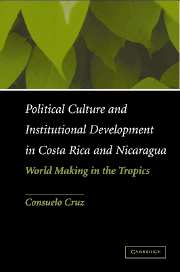 Political Culture and Institutional Development in Costa Rica and Nicaragua
Political Culture and Institutional Development in Costa Rica and Nicaragua Book contents
- Frontmatter
- Contents
- Acknowledgments
- List of Abbreviations
- Chronology
- Political Culture and Institutional Development in Costa Rica and Nicaragua
- Introduction
- 1 Theoretical Overview
- 2 Manichean Identities and Normative Scheming: Origins
- 3 Orphans of Empire: Constructing National Identities
- 4 Postcolonial Paths: Rhetorical Strategies and Frames
- 5 Costa Rica: Possibility Mongers
- 6 Nicaragua: Hybrid Arbitration
- 7 Tropical Histories: Paradise and Hell on Earth
- 8 Transition: Familiar Novelties
- Conclusion
- Index
6 - Nicaragua: Hybrid Arbitration
Published online by Cambridge University Press: 20 August 2009
- Frontmatter
- Contents
- Acknowledgments
- List of Abbreviations
- Chronology
- Political Culture and Institutional Development in Costa Rica and Nicaragua
- Introduction
- 1 Theoretical Overview
- 2 Manichean Identities and Normative Scheming: Origins
- 3 Orphans of Empire: Constructing National Identities
- 4 Postcolonial Paths: Rhetorical Strategies and Frames
- 5 Costa Rica: Possibility Mongers
- 6 Nicaragua: Hybrid Arbitration
- 7 Tropical Histories: Paradise and Hell on Earth
- 8 Transition: Familiar Novelties
- Conclusion
- Index
Summary
Athenians: Since we are not allowed to speak to the people, lest forsooth, they should be deceived by seductive and unanswerable arguments, which they should hear set forth in a single uninterrupted oration … you who are sitting here may as well make assurance yet surer. Let us have no set speeches at all, but do you reply to each several statement of which you disapprove, and criticize it at once. Say first how you like this mode of proceeding.
Melians: The quiet interchange of explanations is a reasonable thing, and we do not object to that. But your warlike movements, which are present not only to our fears but to our eyes, seem to belie your words. We see that, although you may reason with us, you mean to be our judges; and that at the end of the discussion, if the justice of our cause prevail and we therefore refuse to yield, we may expect war; if we are convinced by you, slavery.
Athenians: Nay, but if you are only going to argue from fancies about the future, or if you meet us with any other purpose than that of facing your circumstances in the face and saving your city, we have done; but if this is your intention we will proceed.
–ThucydidesThe proceding passage hints not only at the dangers and the promises of communication, but also at the importance of who participates and how communication proceeds.
- Type
- Chapter
- Information
- Political Culture and Institutional Development in Costa Rica and NicaraguaWorld Making in the Tropics, pp. 146 - 184Publisher: Cambridge University PressPrint publication year: 2005
